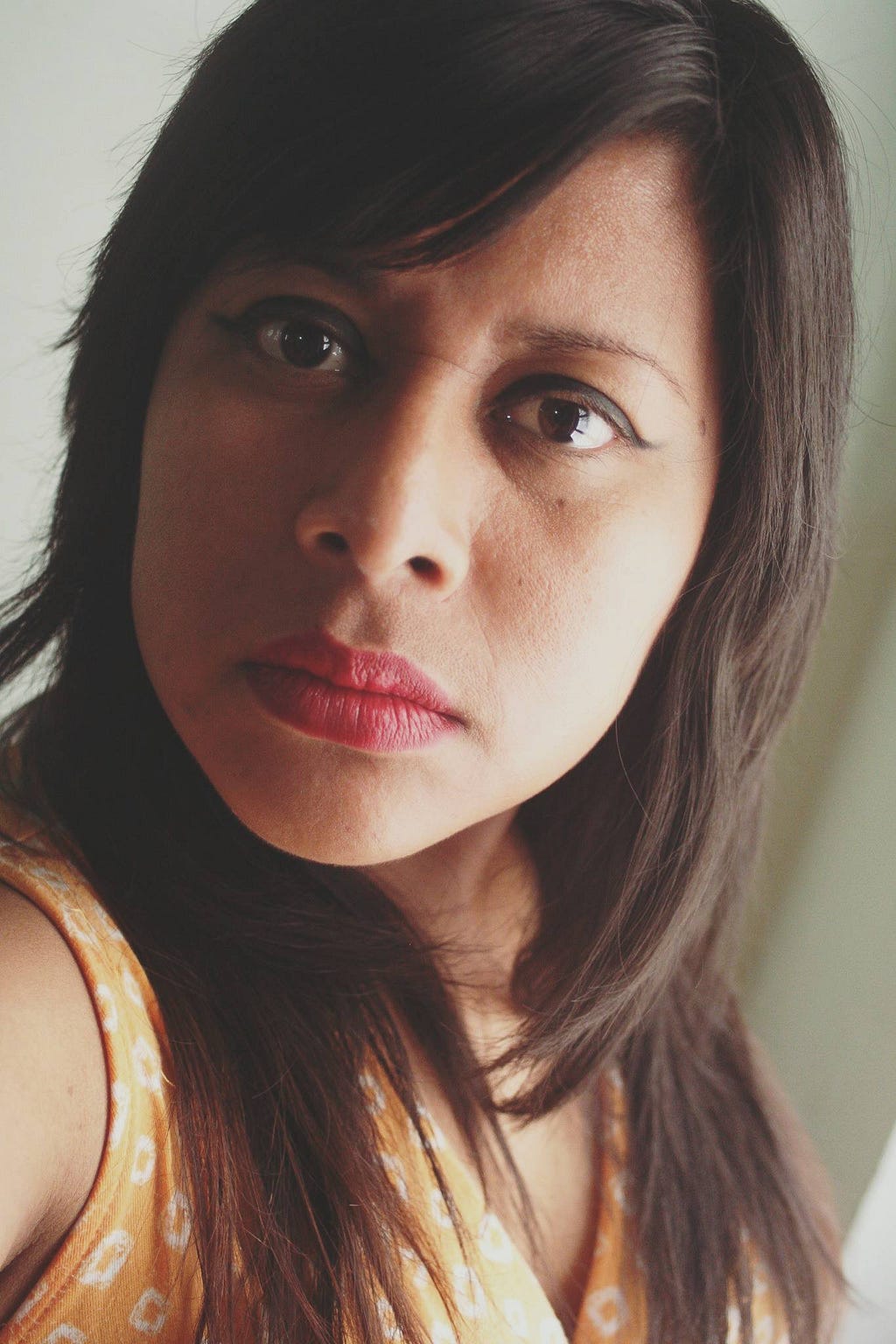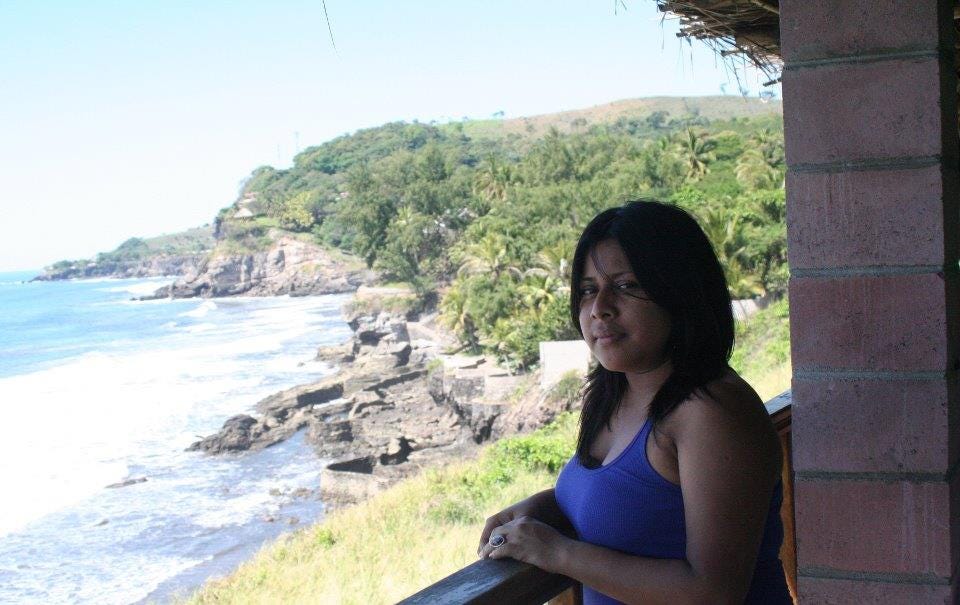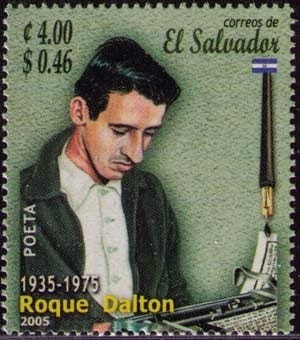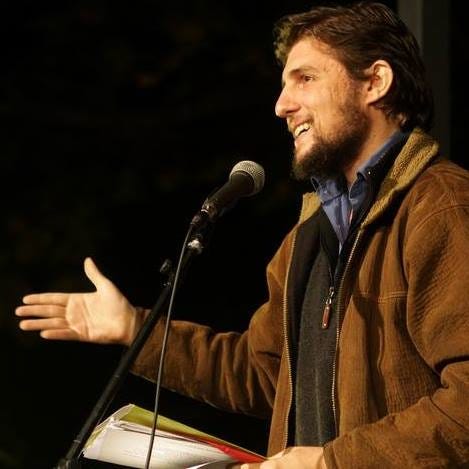Arturo Desimone’s series on Latin American poetry
CANNED COAL BIRD
(interview)

Miroslava Arely Rosales, poet from El Salvador, here talks to Arturo Desimone and Drunken Boat about the source material for her poems. Four of her poems — Destruction, Allegro Vivace, Canned Coal Bird, and Erika are published here, in English translation.
Rosales (San Salvador, 1985) is a Salvadoran poet currently based in Guanajato, México, where she does advanced studies in Spanish and Latin American literature. She forms part of O ISTMO, a Central American academic research network, and is currently the poetry editor of Cuadrivio, a Mexican literary magazine.
Her poems (I first read them in The Acentos Review, a North American magazine known for niche-publishing latinos) show that it is possible to combine Allegro Vivace and the dark consciousness of dwelling in a land ruptured by violence. This poetic landscape brings to mind the fabulous myths about the crossings of roads of the Xibalbá, the Mayan necropolis and underworld (of the culture of Guatemala, neighboring El Salvador): where the day-lit world crosses the ashen world, the cities of accumulated bones like her poem San Pedro Sula; rainfall of knives outside the platinum, metallic shelter of her mother’s womb (in Destruction). She quotes Vladimir Mayakosky, ‘’We, prisoners of the leprosarium-city/ where gold and grime ulcerate life’’) Her poems tear through the postmodern plasticity of a new, violent neo-liberal order, raging against the platinum and plastic necropolis imposed upon Latin American and Central American countries by local regimes and by foreign penetration. Without celebration or acceptance of that reality or its values, Miroslava intuitively seeks to find a place of lucidity, of tenderness, of values but also of ecstasy and poetry, and finds it. Miroslava was named after the Czech-Mexican movie actor Miroslava Stern, who appeared in films such as those of Luis Buñuel.
Miroslava Arely Rosales’ poetry has been published in Nuevas voces femeninas de El Salvador (New Female Voices of El Salvador, University of El Salvador Press, 2009), Una madrugada del siglo XXI (2010), Las perlas de la mañana siguiente (2012), Ventanas de libertad (Secretariat for Culture, 2014), The Theatre under my Skin. Contemporary Salvadoran Poetry (Kalina Press, 2014), and in a host of other anthologies, journals and festivals the world over.

AD: El Salvador and Central America in general are associated, especially in the media, with a level of street crime, violence and corruption that are even considered extraordinary by Latin American standards. These are themes that resound in your nonetheless very personal poems. And yet there is also love, like in the poem Allegro Vivace.
MAR : Of course, love is one of my essential refuges, as well as the imagination and the word. Love moves us, and also makes us think and question ourselves in how we relate to the other, lets us inhabit euphoria despite the tough circumstances. It is the fall, the wound and the caress. Love was and continues to be a difficult animal to tame.
— The poem (‘’Lourdes’’) emerged after I read a sensational news article. I realized that the father had strangled his two little children, and then he committed suicide. This act of horror could not just pass by hardly perceived, forgotten in the pages of a newspaper
I am from a country where the daily bread is death, extortions, drugs and decapitations, all of which we could classify as horror. But despite this clime, I’ve had the opportunity to love in the most intense exalted state as can be understood. Loving is also a way of resisting, so in the end loving is in itself a life, an attempt at communion, an affirmation. In the case of my poem Allegro Vivace, it is one of the few I wrote on the love experience in terms that are both luminous but at the same time contradictory.
AD: In your poem ‘’Destruction’’ you tell us with humor, which is not to say irony, that the womb of your mother provided 9 months of shelter from bullets, fire, knives. Do you possibly find yourself comparing your poetry to the verse written in times of warfare, the genre of literature by those enduring times of war? Is the literature written from those whose countries are the battlefields of the so-called “‘War on Drugs’’ also a genre of war-time literature? (Some random examples that are more renowned would be the poems of Wilfred Owen and Rupert Brooke, or the works of Günter Grass about his childhood in Germany such as the Tin Drum, or the memoirs of Rigoberta Menchú on the conflict in Guatemala, among other all-too-abundant examples.)
MAR: My writing has been defined by my surroundings, and has suffered significant changes. My first project was about the condition of being in love, metaphor of the heart. Then there is the reality that my country is experiencing, it is impossible to turn my back on that. I lived for 29 years in Soyapango, a municipality with high crime-rates. The territorial control of the maras (criminal organizations) is extraordinary, and affects one’s daily life and interactions with others: you mistrust all others, slowly one begins to isolate oneself until suffocation ensues.
Now that live in Mexico, I want to write about the experiences of Central American immigrants to Mexico. Not a simple project! These are stories full of pain and death. For that reason, I like books that approach horror and the grotesque, such as Morgue and Other Poems by Gottfried Benn, or books that try to capture scenery of decadence, such as the Spoon River Anthology of Edgar Lee Master.
AD: In recent years, young writers from Northern Mexico, as well as in Colombia and Central America have begun to develop a new literary genre that arose in relation to the ‘’narco-corrido,’’ ( mariachi songs about drug-lords) There is ‘’Narco-Lit’’: prose and narrative non-fiction and even poetry about the drug-business. These genres avoid more intimate poetic elements, the sensitiveness to be found in your poems (such as in From the Decapitated Country and previous collections) What do you think of “narco-literature” rising in the era of the doomed “War on Drugs”? How do you set your poetry apart from the fashion of dope-trade-lit or “narco-letters’’?
MAR: Narco-literature has come to displace the aesthetics of magical realism as an identifying sign. And it disheartens me to see how Latin America always gets pegged with the associations of violence, misery, backwardness, chaos, because that only wins us stigma without any preoccupation towards transforming this reality. Usually, the representations of the violence in literature serves as bait to lure more consumers who seek exotic and turbulent realities. In most cases it does not translate into any sort of active participation in the processes of change that our countries need.
Poetry has been my refuge, a way of giving answer, of presenting myself before a world in collapse. I think of El Salvador daily, in this hurt and abandoned Central America, at the margin of hegemonic centers.

AD: The figure of Roque Dalton, (1935–1975 influential Salvadoran poet, journalist, author of The Turn of the Offended, High Hour of the Night and other works) is often a point of reference when speaking of Central American and Salvadoran literature and the history of the revolution. Dalton still influences a younger generation of poets in El Salvador and in Latin America (he is well-known among Argentinean poets, for example.) How do you and your poems relate to this legend?
MAR: Well, Dalton is not necessarily known in Mexican literary circles, which is very surprising — we Central American immigrants, and our culture are little-known here in Mexico. So I was very surprised to hear that he is well-known in Argentina. The figure of Roque Dalton indeed continues to be present in the Salvadoran literary world, next to being an icon of the left. His remains are still not found, so perhaps that absence functions in itself as a metaphor for the orphaned condition of Salvadoran society, of a postponed mourning. The personality of Dalton haunts me with his life, actions and aesthetics; above all he invites me not to reduce my preoccupations in art to mere formalism. It is for a reason that my second writing project has an epigraph of his: ‘’País mío no existes/solo eres una mala silueta mía/ una palabra que le creí al enemigo’’ ‘’My country you do not exist/ you are only a bad shadow of me/ a word of the enemy, that I believed.’’
Dalton’s leftism was certainly too unorthodox for the vestiges of the more dogmatic left in El Salvador, those currently to be found in the government, though they have tried to use him as an icon. Many poets born after the murder of Roque keep returning to him as an intellectual role-model (I think of the work of Vladimir Amaya, among others) although his influence is no longer evident, neither in most poetry nor in political praxis, sadly.
AD: Reading poems like “Destruction’’ “Canned Coal Bird’’ and others casts a sense of vulnerability that is intensified and at times is about being female in a world of perpetual violence that proliferates in Central America. It is known that for some time there was a murder of one woman nearly every day in Guatemala City, and one supposes a similar violence in El Salvador. Does that exposure to violence bring you closer to what is essential in poetry?
MAR: Poetry has been my refuge, a way of giving answer, of presenting myself before a world in collapse. I think of El Salvador daily, in this hurt and abandoned Central America, at the margin of hegemonic centers.
I’ll tell you an anecdote about this living in fear. One day a car was abandoned in front of my house. When that happens, it is usually in relation to crime. And this was no exception: they found a man’s head in the trunk. Simple as that! Imagine that. The head of some body, in front of your house. Of course, no one saw anything, nobody heard. Everyone is afraid to bear witness, as witnesses can be assassinated without much fuss. Near my house the bodies turned up, the police didn’t stop that. Disappearances of persons, clandestine cemeteries: this is our reality. And if a girl wears a miniskirt and gets groped in the street by a man, well, the most advisable thing do in a context like that of Salvador is not to scream, because the fellow might be armed.
I taught in a women’s prison in this country for two years, and I accompanied an American photographer — that allowed me to interview prostitutes in San Salvador who often come from Nicaragua and are under the control of the maras. Writing poetry cannot have any direct effect on that reality.
AD: You were promoting the project of an international anthology of poetry dedicated to Berta Cáceres, an indigenous Lenca leader in Honduras and an environmentalist, who was assassinated by the Honduran regime for having protected nature against the corporate projects that are supported by the Honduran dictatorship which serves executives. What is the effect that you hope the publication of such an anthology will have for Honduras and neighboring countries? Why its importance? And when can we expect the anthology?
MAR: The anthology in homage to Berta Cáceres is an initiative of the Union of Writers and Artists of Honduras (the UEAH) and of the Bolivarian Academic Cultural Centre of Honduras and of PEN-Honduras. The coordinators are Jorge Miralda and Galel Cárdenas. So this is an initiative born on the inside of Honduras. In an organization I belong to, the Central-Americanist network, also known as O ISTMO, we realized how important it is to support the preservation of the collective memory of the Honduran people, and we had no doubt about wanting to get involved in this anthology. Our participation as a network consists in collaborating in the spreading of the call for submissions, as well as aiding in the publishing and printing. At this moment, the anthology is still in the process of translation, mostly of French and English poems. We are very pleased about the fact that poets from as many as 22 countries responded to our call!
We hope this helps the cause of recognizing the work of Berta Cáceres in defense of the earth, in a country with grave problems of violence. There still no date for the release of the anthology.
AD: Your short poem ‘’Lourdes’’ tells us of a father who, aided by his ally the night, cuts his children in two, and by day the remains of his child are like two medallions hung in a treetop. But why was it necessary to go to Lourdes, on ‘’pilgrimage’’ to this sacred Catholic site in France, where you’ve never been, when surely there are crimes of that scope in Central America, Mexico and the USA?
MAR: The poem refers to the Lourdes in a district of the municipality of Colón, in El Salvador. So there is no relation with the French Lourdes. Rather, the Salvadoran Lourdes is well-known for crime, the dominance of the maras (the gangs) and for being a hell for its inhabitants. In that district they even found clandestine cemeteries, of considerable size. It represents what the majority of Salvadoran families live through on a daily basis. The poem emerged after I read a sensational news article. I realized that the father had strangled his two little children, and then he committed suicide. This act of horror could not just pass by hardly perceived, to be forgotten in the pages of a newspaper. So I tried to turn it into a poem as a form of memorial to those children.
AD: Please tell us the names of the poets and writers of the Central American countries who need to be read around the world.
MAR : There are two very great Central American writers of fiction who come to mind, Rodrigo Rey Rosa and Horacio Castellanos Moya. My thesis pivots on the latter. But, of course, there are other amazing offerings: the fiction of Claudia Hernández, Rafael Menjívar Ochoa, Denise Phé-Funchal, Jorge Galán, Javier Payeras, Alan Mills, Carlos Fonseca, Vladimir Amaya, Miguel Huezo Mixco, Mauricio Orellana Suárez, Jacinta Escudos, Warren Ulloa, Roxana Méndez, Róger Lindo. But let me make clear that some of these are pretty established and have gotten major publishers and prizes internationally, so they are not unknown outside of Central America.

On the interviewer/ blogger behind Notes on a Return to the Every-Dying Lands: Arturo Desimone, Arubian-Argentinian writer and visual artist, was born in 1984 on the island Aruba which he inhabited until the age of 22, when he emigrated to the Netherlands. He is currently based in Argentina (a country two of his ancestors left during the 1970s) while working on a long fiction project about childhoods, diasporas, islands and religion. Desimone’s articles, poetry and short fiction pieces have previously appeared in CounterPunch,Círculo de Poesía(Spanish) Acentos Review, New Orleans Review, in the Latin American views section of Open Democracy, BIM Magazine, Knot-Lit. A play he wrote won a prize for young immigrant authors in Amsterdam in 2011, and published in the world-lit journal of University of Istanbul. His translations of poetry have appeared in the Blue Lyra Review andAdirondack Review.
Notes on a Return to the Ever-Dying Lands was originally published in DrunkenBoat on Medium, where people are continuing the conversation by highlighting and responding to this story.
